- Home
- Mordecai Richler
A Choice of Enemies Page 17
A Choice of Enemies Read online
Page 17
“A beautiful person bashed to bits by the soul-destroying machine of American capitalism.”
“Something like that.”
“Charlie,” Norman said. “Charlie.”
Charlie bit his lip. “I’m a bum,” he said, offering his confession to Norman like a cake. “You look at Hale, though. A big cheese he is in Toronto. He’s a frustrated artist, that’s what he is. He sold out.”
“So what?”
“I thought you didn’t like Hale?”
“Why did you leave the States, Charlie? You weren’t blacklisted.”
“In another month they would have deported me. They – I’ve always wanted to come to London. I love the British.”
“How many do you know?”
“Here,” Charlie said, leaning still closer and offering his cheek to Norman. “Hit me.”
“Charlie,” Norman said, “please.…”
Charlie hid his face in his hands.
“Why don’t you take Joey back to Toronto with you?” Norman asked.
“I wanted to be famous.”
“O.K.,” Norman said, “but you’re not. A few –”
“Oh, I wish I was like you. I wish I was a stone and didn’t feel anything.”
“A few minutes ago you told me that you didn’t have enough talent. Are you going to go back on that now?”
“You don’t like me,” Charlie said. “You never have. Admit it.”
“Charlie. Come on, Charlie.”
Charlie’s eyes wavered. Again and again he wiped the table clean with his hands. “I could never go back and face them there, Norman. Before I left for Hollywood I told them exactly what I thought of them in Toronto.” His voice rose to a hysterical pitch, “The CBC presents.…” and cracked.
“Go back to Toronto, Charlie.”
“I used to be so sure of myself. I would go to bed with a magazine that had a picture of Humphrey Bogart on the cover and I would be sure that I’d meet him some day and that we’d like each other. I could imagine him phoning me. ‘That was a sensational script, Charlie. Why don’t you write me something one of these days?’ I’d dream about spending weekends with Arthur Miller and phoning Ava Gardner long distance from Paris to say she’d just have to forget me. Go ahead, laugh. Tell me I’m a child. But I saw myself an intimate of Hemingway and Huston and telling Louis B. Mayer he could go shove his millions, but I wouldn’t change a line of my last script for him. I was so sure I was going to know all those people. And I’ll tell you something, Norman, even now I know that they would have liked me. Even you have to admit that I’m very amusing at parties. Everybody says I’m witty.”
Charlie sighed; he cracked his knuckles.
“I thought I would go back to Toronto occasionally and maybe even buy a house in the suburbs – I would never drop names – but famous people would come to my house for weekends from New York and Hollywood and London and I would be at the station shooing away photographers, but getting in the papers anyway.… I’m being honest with you.”
“I know, Charlie.”
“How can I go home like this? A failure.”
“Don’t go home,” Norman said, irritated. “Stay here.”
“I’m nothing. A bum. Even in Toronto they used to turn down most of my scripts.”
“If you’re so anxious to be famous why not turn informer? Like Waldman. That’ll get you in the papers.”
“Look here,” he said, “all my life I’ve been a man of integrity.” Charlie cast a cold eye. “If I had to do it to save my life,” he said, “I could never inform.”
“Good for you.”
Charlie half-shut one eye. “I used to hope,” he said, “that I could always say the same thing for you.”
“You and I, Charlie, have different problems.”
That, Charlie thought, is as good as a confession. He began to feel a little better.
“You’re a cold one,” Charlie said. “I’ve never been able to understand you. Nothing seems to affect you.”
“Not even that weather,” Norman said.
“Haven’t you ever looked through the ads in the New Yorker and wanted the girl, let’s say, who models slips for Vanity Fair? Wouldn’t you like to be invited to one of those Hollywood parties where naked girls jump into the pool? Haven’t you ever longed to go to Nassau or the opening of a Hilton Hotel?”
“We’ve got different problems. I want to get married and have children. I’d like to finish my book.” Norman got up. “I’ve got to go now. Ernst ought to be around this afternoon to do more work on the bookcase. Will you tell him to phone me, please?”
“I’m afraid we’ve decided not to allow Ernst into the flat again.”
“I hate to remind you of this, Charlie. But that’s my flat. You and Joey are only there temporarily.”
“You want it back. Take it. We’ll move out next week.”
“All right,” Norman said. “If you like.”
Charlie left the coffee bar without bothering to say good bye. Look at them, he thought, look at all those bastards walking up and down the street. I’m bleeding, he thought, and nobody cares. Charlie began to walk more quickly. Maybe, he thought, there’s a contract or a cheque in the mail. Today may be my lucky day. You can never tell.
XXIII
Norman trudged slowly home in the rain. What, he thought, if Charlie was telling the truth, and I have been to bed with Joey? No, that’s crazy. But I do suffer from lapses of memory.…
Norman felt like one of those animals in an animated cartoon who had been shot up into the sky and stood there amazed and treading air desperately.
His head ached, he felt feverish, and turning up Edgware Road he was suddenly consumed by a fierce, choking sadness.
Oh, damn this dying capital, he thought.
Think of it. Think of all the shifting, homeless people of London, scrabbling over each other’s backs and just about making-do. All those tweedy, slap-footed girls reqd. at a starting sal. of £10 wk., long hopeful ladies with commercial knowl. & exp. and a shorthand and typing speed of 100/50 w.p.m. being offered canteen facilities, a pension scheme, chilblains, a divan-sit, with a gas ckr. of their very own – Comf. musical/lit interests – and, once yearly, a chance to chase the sun to Sorrento or Southend for two more weeks of chastity. Norman bent into the rain, his back hunched as though from every window these girls were peering down at him accusingly. Oh, give a moment’s thought please to the librarian, Grade IV, with some practical exp. of classifying, cataloguing, and rolling his own cigarettes, off tonight to hear Donald Soper and other prominent speakers protest at Carton Hall, and to look left, right, and centre, only to come home alone again to an X cert. dream. A thought, too, if you don’t mind, for Mayfair Social Appointments, who will find you the Right Partner for all occasions. A second’s silence, please, for the elderly lady who hawks Peace News in the wind and the rain of Edgware Road.
Think of the pain, Norman thought, the pain of all these people in their damp, ill-lit individual cells. Add it up.
What, he thought, am I doing in London?
Sometimes those animals in the animated cartoon managed to walk across the sky to the roof of the nearest skyscraper. Other times they suddenly realized where they were and came crashing down to the pavement.
Norman hurried home in the rain.
XXIV
Karp was waiting for him on the bed. “I’m sorry about last night,” he said. “I meant to serve you a stupendous dinner.” Karp rose, and leaned forward on his cane. “Everything is going to be perfect,” he said.
“What do you mean?”
“Tell me the truth, Norman. Do you still love Sally?”
Norman’s face darkened. He glared at Karp.
“Ah,” Karp said, “just as I thought.”
“What do you want?”
“You’re my only friend, Norman. You’re the only person I care about.”
“Come to the point.”
“I live vicariously, so to speak.”
> “Karp!”
“Objectively speaking,” Karp asked, “is my walk very feminine?”
“Not very.”
“But I have no dignity; have I?”
“What’s happened?”
“Supposing,” Karp said, “your brother Nicky had not been killed on manoeuvres?”
Norman shook off his fatigue.
“Supposing,” Karp said, “he had been killed quite by accident in a brawl?”
“Give me the letter, Karp.”
“What letter?”
“Don’t pretend. I got a letter from my Aunt Dorothy. You opened it. Give it to me, Karp.”
“There was no letter.”
“Then what –”
“I would not like to be in your position.”
“What do you mean?” Norman asked weakly.
“Because it was not Ernst’s fault. I know the story. Your brother brought it on himself.”
“Brought what on himself?”
“Ernst killed him.”
“My brother,” Norman said. “Are you sure?”
“Absolutely.”
Norman seized Karp by the shoulders and shook him.
“Who told you?”
“She did.”
Norman let him go.
“She knows?”
Karp nodded.
“You’re mad, Karp. I don’t believe it.”
“They might run away,” Karp said. “What are you going to do?”
Norman took the stairs three at a time. Karp pursued him.
“She’s out,” Karp said. “She won’t be home from school for hours.”
“Where’s Ernst?”
“Wait.” Karp took out a key. “There you are.”
The room was intact. They hadn’t fled.
“I’ll kill him.” Norman shook his fist under Karp’s face. “I’ll kill that little bastard with my own hands.”
Karp sucked his thumb. He smiled lasciviously.
“I’ll kill that little Nazi,” Norman shouted.
Karp clapped his hands together. “Then Sally will be yours,” he said.
Norman turned furiously on Karp.
“Sure,” Karp said, “don’t you want the girl?”
He slapped Karp hard.
“The best ones were killed, Karp. Only the conniving, evil ones like you survived.”
Norman collapsed on his bed and lay there for a long time before he got up and undressed.
I’ll kill him, he thought, that’s for sure.
Norman emptied his pockets as he intended to take his suit to the cleaners when he woke. Once in bed he fell into a deep, untroubled sleep.
3
I
NORMAN WOKE SHORTLY AFTER NOON WITH A HEADACHE and a shapeless feeling of disquiet. Something more alarming than the bad taste in his mouth was hounding him, but the nature of his complaint was elusive. Norman rose warily, like one who expected his right to rise to be challenged. But this wasn’t the air base. Neither was it the hospital. This was his own room in Hampstead. The clock on the floor, his desk, his books, even the cigarette burns in the rug, were exactly as they should be. Norman put on a clean shirt, got into the suit that he had meant to take to the cleaners, and shoved ten one pound notes into his pocket. The rest of his things he left on his desk.
Outside, he wandered down to Swiss Cottage. Something was bothering him. But whatever it was would, he felt, reveal itself to him around the next corner, like the fires he had chased as a boy. But around the next corner and the one after that it was all the same: rain.
In the tube station Norman began to suspect that he was being watched. Eight times he read a poster urging him to bring the Evening Standard home to his wife. Somebody, another bachelor perhaps, had blackened the teeth of the wife in the poster. Norman started as the train came thundering into the station. Someone could easily have pushed me in front of it, he thought. He boarded a nonsmoking car. The watchful strangers saw that he had no newspaper to read. He could tell from their smiles that they also knew that he, unlike the others, had no destination.
Norman fiddled with his glasses.
At Oxford Circus he got out and on again a couple of cars back. Next thing he knew they were at Waterloo. Norman wandered up to the air terminal. He bought an Evening Standard and sat down near the arrivals stairway. But even armed with a newspaper he felt restless, and so he drifted up to the bar. A hard, barely feminine voice announced over the loudspeaker that passengers from Zurich had just arrived in the terminal. That’s when Norman first realized that he had lost his memory. He was astonished. This is ridiculous, he thought. Norman watched as some, who had been listening intently to the voice over the loudspeaker, slumped back in their chairs while others hurried off. He was not sure what was expected of him. He waited as the passengers began to emerge.
Last up the stairs was a woman with two children. An attractive brunette, probably French and an official’s wife, she held hands with both her boys. The younger one was blond with rosy cheeks and must have been about four years old. He held an orange balloon in his free hand. Nobody met them. The woman looked right and left severely, not disappointed but irritated, as though being beyond public displays of affection herself, she could forgive her husband thoughtlessness and even promiscuity, but never a lapse in efficiency. As a steward rushed to her aid the four-year-old boy lost his grip on the balloon. He began to wail as it floated lazily upward. Norman followed the orange balloon’s twisting course until it became lodged in a corner of the ceiling, then he jumped up in a panic and walked round and round under it. Laughter, albeit gentle in tone, rose in proportion to the child’s screeching. When Norman looked around again the woman and the two children were gone. Norman grabbed the steward by the arm.
“Hey,” he said, “what about the balloon?”
The steward laughed good-naturedly.
“You may consider this a joke, but I don’t.” Norman seized him by the shoulders. “What are you going to do about the kid’s balloon?”
The steward broke free. “Easy, guy.”
“I asked you a straightforward question.”
Norman caught the look of astonishment in the other man’s eye.
“I’m sorry.” Norman drew back, terrified. “I didn’t mean.…”
Norman’s clothes clung to him damply. At the bar he ordered a whisky and soda.
“That’ll be three and six, sir.”
He found some money in his pocket – a lucky thing, he thought – and paid for his drink. “One moment,” he said.
“Yes, sir.”
“Judging from my accent where would you say I was from?”
“That’s easy, sir. You’re an American.”
In the mirror Norman saw that he must be between thirty-five and forty years old.
“Were there any planes in from the States today?”
“Flights from overseas arrive at Victoria, sir. This is Waterloo, this is.”
In the toilet Norman went though his pockets. No papers, no baggage slips. Nine pounds and some change was all he had on him. He checked his suit jacket lapel. Meakers of Piccadilly. It had been bought in London, but it was at least a year old. Looking in the mirror he saw that he didn’t need a shave. He was reassured. I haven’t been wandering around like this for long, he thought.
Outside, he got on the first bus headed for the West End. But he took the bus on the wrong side of the street. He was at Clapham before he noticed it. They drive on the left side here, Norman thought triumphantly. I know. He boarded a bus going in the other direction.
A long trip it was. The longest. For the first part of the journey there was the London poor. Short, beefy people with grey teeth who bore their soiled raincoats like skins. Outside and forever a charred, broken sky and the rain. Black trees and blacker sidewalks. Rain, rain, rain. The people of the Thames were shaped by the rain, he thought, and what a sodden bunch they are. From Clapham to Lambeth there came some of the most forlorn houses he had ever seen. Brown and
grey and red brick all uniformly blackened now. A child’s pink face in the third storey window of a hunched, fractured house. Flaking public houses wedged between shops, and in every block at least one sweet shop with a faded display of Players in the sooty window, as though for a race of Puritans only the mildest of vices would do.
As they approached the West End the fastidious ones with the big briefcases assumed their seats on the bus. Not next to the big Greek lady. Stand better than share a seat with the dustman. They were taller than the workers; whiter too. There was a semi-detached cottage and a dead man’s job in their futures. Not a “good address,” though, because that was saved for the still taller ones. Norman rubbed the back of his neck. It occurred to him that after forty endless years of HP and subservience one of these fastidious men might, at last, get his semi-detached cottage only to find that the repudiated dustman, a pool’s winner, had moved into the bigger one next door. Norman smiled. Everything will work out, he thought.
At the desk of the Regent’s Palace Hotel the clerk asked him, “Have you a reservation, sir?”
“No, I’m afraid not,” Norman said, “but any single room will do.”
“We might just have something on the fifth floor.” Peering over the counter the clerk saw that Norman had no baggage with him. “Are you an American, sir?”
“Yes.”
“Will you fill out this form please. You put your passport number here.”
“I’ve been travelling all night. May I fill this out after I’ve had some sleep?”
“Regulations, sir.”
A couple began to jostle Norman from behind.
“I’ll come back. I’ve just remembered something.”
Norman sat through Commanche Warrior two and a half times before he woke. Outside, it was raining again. Norman walked quickly, as though he was being pursued. He walked down the Strand and from there to the river. He followed the river as far as Cheyne Walk, then he turned up to the King’s Road. His head pounding, his legs aching, his feet burning and tender, Norman stood at the bar in the Lord Nelson for more than an hour before he noticed the girl beside him. She was alone. An unassured, sensibly dressed girl with her black hair clipped boyishly short.

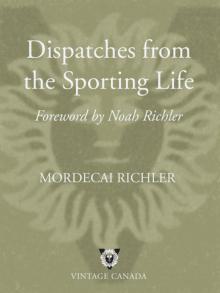 Dispatches From the Sporting Life
Dispatches From the Sporting Life The Acrobats
The Acrobats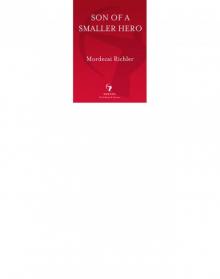 Son of a Smaller Hero
Son of a Smaller Hero Jacob Two-Two-'S First Spy Case
Jacob Two-Two-'S First Spy Case Jacob Two-Two Meets the Hooded Fang
Jacob Two-Two Meets the Hooded Fang Jacob Two-Two and the Dinosaur
Jacob Two-Two and the Dinosaur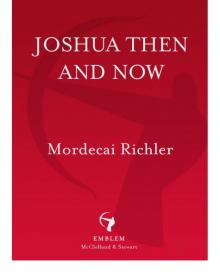 Joshua Then and Now
Joshua Then and Now Solomon Gursky Was Here
Solomon Gursky Was Here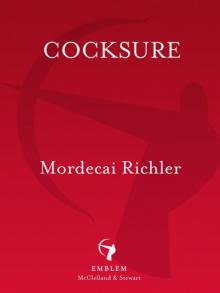 Cocksure
Cocksure The Street
The Street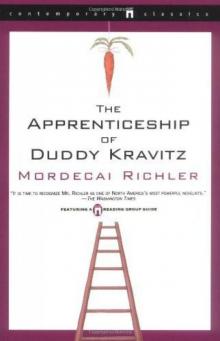 The Apprenticeship of Duddy Kravitz
The Apprenticeship of Duddy Kravitz A Choice of Enemies
A Choice of Enemies Barney's Version (Movie Tie-In Edition)
Barney's Version (Movie Tie-In Edition)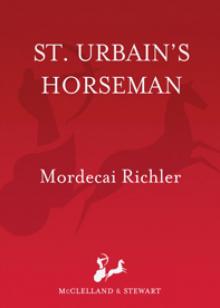 St. Urbain's Horseman
St. Urbain's Horseman The Incomparable Atuk
The Incomparable Atuk Barney's Version
Barney's Version